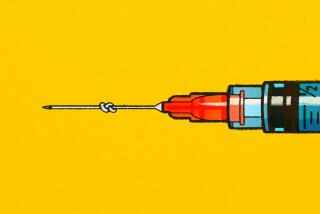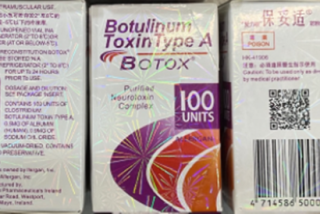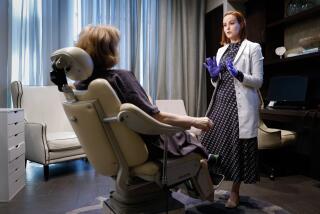Fake products can bypass quality, safety
In San Diego, two people fell gravely ill after receiving black-market silicone injections to plump up their faces.
In Salinas, Calif., a woman died after receiving a supposed Botox injection that was actually cooking oil.
And in Miami, a group of people who thought they were getting Botox became paralyzed after a different, highly concentrated form of the deadly botulinum toxin intended for research purposes was injected into their faces.
These cases were extremes, resulting in serious illness or death. But many thousands more consumers are believed to be skirting danger and wasting their money on bogus cosmetic injectables -- counterfeit Botox, fake Restylane and other knock-off wrinkle-fillers.
Experts familiar with the problem say that as many as 5% of all cosmetic injectable treatments in the United States may be counterfeit. Some of the worthless treatments are provided in dubious settings, such as private homes -- places that should arouse consumer suspicion. But many others are administered by doctors or nurses who don’t realize they have purchased counterfeit substances or are knowingly using the fake goods to boost their profits.
The problem of counterfeit products in the cosmetic-plastic surgery field has become so widespread that major medical groups are taking steps to warn consumers, and manufacturers of legitimate products are revamping their packaging for easier authentication.
“There is no question that as these procedures increase in popularity, counterfeiting has become a bigger problem,” says Jonah Shacknai, chief executive of Medicis, the maker of the popular dermal filler Restylane. He says that Medicis and the federal government have unearthed counterfeit rings that produce unknown substances and package them in look-alike Restylane boxes.
Worldwide, the larger problem of fake medical drugs and devices has increased dramatically in recent years, says Jim Rittenburg, vice president for healthcare and life sciences at Authentix, an Addison, Texas-based company devoted to product authentication.
But certain products hold more allure, including expensive substances that are used in small quantities, such as injectable cancer drugs, HIV medications and cosmetic injectables.
Americans who are fed up with high drug prices may be unwittingly fueling the problem, Rittenburg says.
“People are cynical about the pharmaceutical industry and don’t mind going over the borders or on the Internet to buy drugs,” he says.
Moreover, unlike cancer or HIV treatments, consumers may not view cosmetic enhancements as medical treatments and thus may be more willing to obtain the products in black-market settings such as private homes, storefronts, gyms, hair salons and nail parlors, says Dr. Michael McGuire, a plastic surgeon and associate clinical professor at UCLA. But, he says, “A lot of these products have really caused harm.”
Among the problems: Improperly made botulinum toxin can kill or paralyze. Silicone is highly dangerous if injected improperly. And bacterial contamination has been found in fake Restylane products.
Not only is product quality important to the outcome, but the experience of the person injecting it and that person’s ability to handle problems, such as an allergic reaction, is paramount to safety, McGuire says.
“Consumers think it’s like putting on makeup; that anyone can do it and there is nothing to it,” he says. “Well, there is a lot to it.”
The Food and Drug Administration and law enforcement agencies have stepped up efforts to stop counterfeiters -- including new federal regulations announced earlier this month that will monitor drugs through the shipping process using radio-frequency tracking devices.
But the best protection, for now, lies with increased public awareness. Consumers should only seek cosmetic injectables from legitimate medical doctors, particularly specialists such as dermatologists, plastic surgeons, ocular plastic surgeons and facial plastic surgeons, Shacknai says. If patients are going to doctors outside these four specialty areas they should ask about their training, he says.
Even these measures may fall short. One of the most discouraging aspects of the counterfeiting problem, experts say, is that some licensed doctors are willingly purchasing the bogus goods and passing them off to consumers as the real thing.
“It’s a competitive marketplace, and if you can offer Botox at half the rate, you’re going to attract a lot more patients,” McGuire says.
Cut-rate prices can be one tip-off that a product may be fake, Rittenburg says -- as can the product’s labels. Several top manufacturers, such as Allergan, the maker of Botox, and Restylane’s Medicis, affix hard-to-copy holograms to their product labels for verification.
“Patients,” Shacknai says, “can ask to see the hologram, and see the box as it is being opened, if they have any concerns that their physician may be injecting them with something other than the real product.”
More to Read
Inside the business of entertainment
The Wide Shot brings you news, analysis and insights on everything from streaming wars to production — and what it all means for the future.
You may occasionally receive promotional content from the Los Angeles Times.









